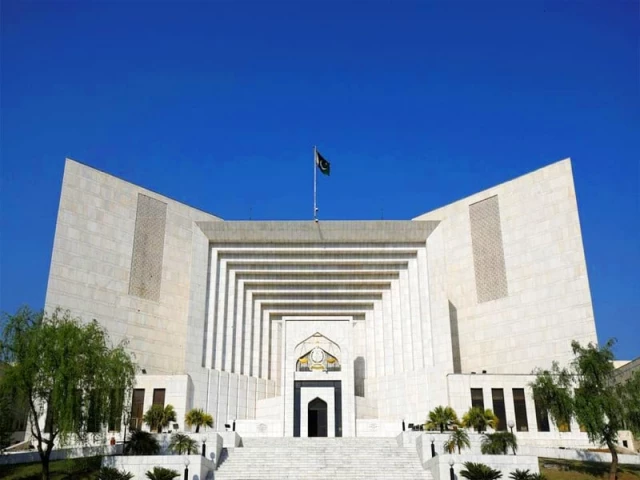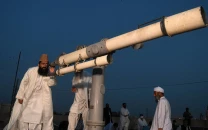SC committee clips wings of acting CJP
Some legal experts believe that Clause 5 of newly notified procedure contrary to Constitution

The committee formed under the Supreme Court Practice and Procedure Act, 2023 has made the office of acting chief justice of Pakistan (CJP) ineffective by adopting a procedure.
The committee — led by Chief Justice of Pakistan (CJP) Yahya Afridi and comprising Justice Syed Mansoor Ali Shah and Justice Aminuddin Khan — on May 29 made a new procedure to regulate its business.
A notification in this regard has been issued by Supreme Court Registrar Muhammad Saleem Khan. The same notification has also been uploaded on the Supreme Court website this week.
The notification said the Supreme Court (Practice and Procedure) Act, 2023 has shifted to the committee the powers of constitution of benches and powers which were earlier exercised by the CJP.
It stated that the Supreme Court (Practice and Procedure) Act, 2023 is not comprehensive to deal with many eventualities like emergencies and absence of the CJP for being abroad. “It is necessary to regulate such voids not covered by the Supreme Court (Practice and Procedure) Act, 2023”. Therefore, in exercise of the powers conferred by sub-section 2 of section 2 of the Supreme Court (Practice and Procedure) Act, 2023, the committee made a procedure to regulate its business.
The notification stated that these procedures may be called the Supreme Court (Practice and Procedure) Committee Procedure, 2025 which will come into force at once.
Clause 1 of the procedure states that the chairperson, the CJP, shall convene the meeting of the committee as and when necessary, physically or through virtual means, for the purpose of constitution and reconstitution of benches.
Clause 2 of procedure states that a minimum two members shall form the quorum of a meeting of the committee. Clause 4 says the committee shall constitute and reconstitute benches when required with regular intervals, preferably monthly or on fortnightly basis.
“Once finalized and issued, no change shall be made, save as provided under these procedures. Any change in the constitution of the committee including change of the chairperson or a member shall not invalidate the constitution of benches finalized by the committee,” it says.
Clause 5 says that whenever the chairperson — the CJP — proceeds abroad or is unavailable to chair the meeting, he may constitute a special committee to deal with matters relating to reconstitution of benches if any of the urgent situations arises like sudden illness or absence of a judge, death or recusal of a judge.
The special committee will be strictly limited to the urgencies and shall be recorded in writing, indicating reasons. Such temporary alteration shall be reported to the committee at its next meeting.
Clause 6 says that SC registrar shall maintain record of all meetings, decisions, and alterations.
Clause 7 says that these procedures shall have effect notwithstanding anything to the contrary contained in any other rules for the time being in force. Clause 8 says the committee may amend these procedures from time to time, as deemed necessary.
Some legal experts believe that Clause 5 of newly notified Supreme Court Practice and Procedure Committee Procedure 2025 is contrary to constitutional provision and the purpose of this procedure is to make the office of acting CJP redundant.
Former Lahore High Court judge Shahid Jamil said rule 5 of the Supreme Court (Practice and Procedure) Committee Procedure, 2025 is in direct conflict with Article 180, dealing with appointment of acting CJP especially when the incumbent top judge is absent from Pakistan.
“It is incumbent upon the president to appoint the acting CJP, who shall be the most senior judge of the Supreme Court. Most importantly, the acting CJP shall act as the CJP during the absence.
Shahid Jamil said Rule 5 is authorizing for consideration of a special committee, if the chairman of the committee is abroad or unavailable. “The act has not used the word chairman of the committee, only the CJP is made one of the members alongside the Senior Judge of the Supreme Court and Constitutional Bench.
In absence of the CJP, the most senior judge would, after appointment as the acting CJP, perform all the functions and exercise all powers of the CJP,” he added.
Some legal experts said the committee led by CJP Afridi has exclusive power to decide about the cases which will be referred to constitutional benches for adjudication.
However, the committee led by CJP Afridi and comprising Justice Shah and Justice Khan has been redundant as no regular meeting is being held to discuss the constitution of benches.
Sources revealed to The Express Tribune that there has been practically no committee meeting since Justice Afridi took charge as the CJP. Perhaps, there was only one committee meeting on May 29 wherein the procedure was approved by the committee members.
Sources said that there is no discussion or debate on how cases are being marked and benches made.
Some senior lawyers are wondering as to why two senior judges adjudicate as division benches while junior judges are part of three-member benches.
It is learnt that only the proposed roster is sent to committee members for approval. During the tenure of CJP Afridi, no minutes of committee meetings were uploaded on the SC website.
Talking about the purpose of the procedure, a lawyer said it was done mainly to introduce Clause 5 wherein it is elaborated that the CJP will form a special committee to deal with the matters in his absence.
He said the beneficiaries of 26th Constitutional Amendment are very nervous to leave matters in the hands of an acting CJP. “Under the present Constitution, Justice Syed Masoor Ali Shah will be the acting CJP. They fear that Justice Shah as the acting CJP may do anything which will create trouble for them.”
Justice Shah has worked as the acting CJP twice in the recent past. One section of lawyers is questioning why Justice Shah endorsed the procedure, which is contrary to the Constitution. Perhaps he did not react as clause 5 of the procedure is directly related to him, said a lawyer.






















COMMENTS
Comments are moderated and generally will be posted if they are on-topic and not abusive.
For more information, please see our Comments FAQ